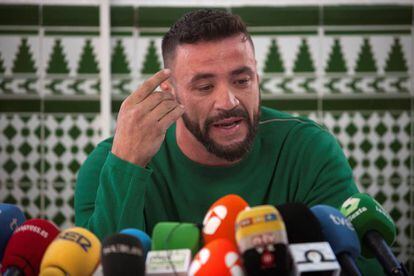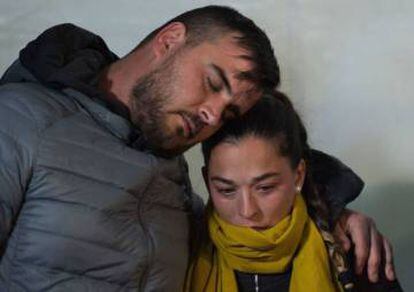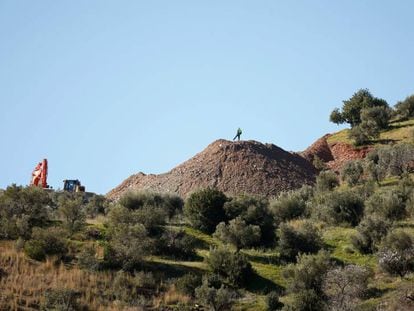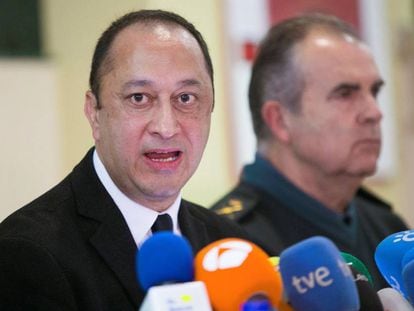Owner of property where Julen Roselló died is named suspect in court probe
The Spanish toddler was killed when he fell down an unlicensed borehole that David Serrano had paid a company to drill

The judge investigating the death of two-year-old Julen Roselló, who fell to his death down a 110-meter borehole in Totalán, in the southern Spanish province of Málaga, has formally named the owner of the rural property where the toddler fell as a suspect.
I thought someone’s foot could slip in and break but I never thought a child would fit
David Serrano, property owner
This comes a day after prosecutors in Málaga asked for David Serrano to be investigated for involuntary manslaughter. Serrano’s defense lawyer Antonio Flores confirmed his client had been formally named as a suspect.
This development means that the public prosecution has ruled out, for now, the possibility that other people were criminally responsible for Julen’s death.
Julen fell down the borehole on Sunday, January 13, during a family lunch, and his body was recovered 13 days later thanks to an unprecedented rescue operation involving more than 300 people. A Málaga courtroom opened an investigation into the incident to determine whether negligence was involved.

According to judicial sources, 12 witnesses will testify in the case, including Antonio Sánchez, the head of Perforaciones Triben, the company that made the borehole; Julen’s parents, José Roselló and Victoria García; four Civil Guard officers; and the hikers who arrived on the scene just after the accident happened and called emergency services.
Serrano has denied any wrongdoing and his lawyers have shifted the blame to Sánchez, who drilled the 110-meter borehole. “The person who ordered the work was named as a suspect but not the person who did it,” said Flores. “We don’t understand.”
At a press conference in early February, Serrano said that he had covered the hole with two concrete blocks at 1pm on January 13 – just minutes before the toddler fell down the shaft. Serrano also maintained that he had warned people in the area about the hole. “I thought someone’s foot could slip in and break, but I never thought a child would fit,” he said.
According to Serrano, Julen “slipped” through the blocks and fell. “I have a two-year-old girl who played with Julen and it could have been her. I will never forgive myself,” he said, sobbing as he read out his statement.
Serrano’s version of events contradicts the one provided by Sánchez. The head of Triben Perforations told the Civil Guard that he covered the borehole once it was completed “like I always do.” He clarified that he had placed a huge rock over the hole to prevent any accidents but said this was later moved.
Serrano’s lawyers say it is impossible to predict or prevent what happened to Julen
Serrano explained that he had flattened a section of land on his property in order to grow avocados and had ordered the borehole to see whether there was any underground water that could be used for the fruit trees.
The property owner recognized that he did not have the necessary permits to complete this work but trusted that Sánchez had permission to dig the borehole. Serrano paid €12 for every meter of the borehole, which would have been raised to €27 per meter had water been found. “I paid him the money. He didn’t give me a receipt or anything and he left with the machine, leaving the borehole open and a mountain of sand next to it like a volcano at the foot of an uneven slope,” said Serrano.
“No one could have seen it as a real possibility”
At the press conference, Juan Martínez, who is representing Serrano together with Antonio Flores, said that their defense would center on the fact that the borehole lacked the necessary permits and documentation, meaning it was illegal. The lawyers said that it is impossible to predict or prevent an accident like Julen’s “because it is without precedent in the world,” and disagreed that Serrano is responsible for involuntary manslaughter.
“David could never have been aware of the risk, no one could have seen it as a real possibility. Even the Civil Guard thought the child wasn’t there because he couldn’t have fit,” the lawyers said. Civil Guard spokespersons explained on numerous occasions that whatever doubts there may have been at the beginning were ruled out once they spoke with Julen’s parents, who explained how they saw the two-year-old fall.
Serrano’s lawyers added that 800 children die from domestic accidents each year and that in these cases there is no accusation of “involuntary manslaughter, even though they are foreseeable things that could have been prevented.”
The lawyers said they want the case to be shelved, arguing they don’t agree with the idea that “someone has to be guilty.” But, they added, if the investigation finds any “criminal responsibility” it should be placed on Sánchez for drilling the illegal borehole.
English version by Melissa Kitson.












































